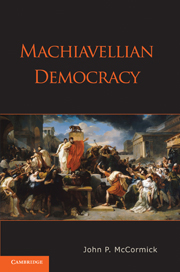Book contents
- Frontmatter
- Contents
- Preface
- Abbreviations for Machiavelli's Writings
- Introduction: Liberty, Inequality, and Popular Government
- PART I
- PART II
- 3 The Benefits and Limits of Popular Participation and Judgment
- 4 Elections, Lotteries, and Class-Specific Institutions
- 5 Political Trials and “the Free Way of Life”
- PART III
- Notes
- Acknowledgments
- Works Cited
- Index
4 - Elections, Lotteries, and Class-Specific Institutions
Published online by Cambridge University Press: 05 June 2012
- Frontmatter
- Contents
- Preface
- Abbreviations for Machiavelli's Writings
- Introduction: Liberty, Inequality, and Popular Government
- PART I
- PART II
- 3 The Benefits and Limits of Popular Participation and Judgment
- 4 Elections, Lotteries, and Class-Specific Institutions
- 5 Political Trials and “the Free Way of Life”
- PART III
- Notes
- Acknowledgments
- Works Cited
- Index
Summary
The tribunes were ordered with such eminence and reputation that they mediated between the plebs and the senate, and halted the insolence of the nobles.
Machiavelli, Discourses I.3In my opinion, the office of the tribunes did the Romans more harm than good.
Guicciardini, Dialogue, Book IIThe constitutions of modern republics attempt to keep public officials accountable and responsive in three principal ways: through the reward/sanction scheme of election and prospective reelection; the institutional counterposition of functionally separated powers; and, in extreme cases, the threat of removal through impeachment procedures conducted by other public officials. All citizens are formally eligible to hold office in such schemes, and the category “elite” applies technically only to those who do. These constitutions posit a sociologically anonymous political subject, “the sovereign people,” out of which political elites are made and unmade through general elections.
These institutional arrangements and the principles underlying them would strike many adherents of premodern popular government as odd, unjust, and dangerous. From their viewpoint, if wealthy citizens are free to stand for all magistracies, if they can participate in every public council, and if unqualified election is the only device that determines officeholding or assembly attendance, the wealthy would hold distinct and persistent political advantages over poorer citizens. The rich would simply overwhelm the political process. After all, wealth enables such citizens to cultivate greater reputation, a more distinctive appearance, and better public-speaking skills such that voters almost inevitably choose them in electoral contests.
- Type
- Chapter
- Information
- Machiavellian Democracy , pp. 91 - 113Publisher: Cambridge University PressPrint publication year: 2011

